Dogs are beloved members of our families, and it’s natural to want to share our food with them. However, what’s safe and nutritious for humans can often be toxic or harmful to our canine companions. When it comes to meat, a staple in many human diets, understanding the specific types and preparations to avoid is crucial for your dog’s health and safety. While many human foods are off-limits, it’s particularly important to understand that not all meat is suitable, and even generally safe meats can become dangerous depending on preparation. For instance, some specific raw meats can be carefully considered for certain breeds, as discussed in detail for what raw meat can french bulldogs eat.
Canine digestion and metabolism are vastly different from ours, meaning dogs process certain substances much slower or simply cannot handle them. This guide will walk you through the various types of meat and meat-related products that should never be given to your dog, helping you make informed decisions to keep your furry friend healthy and happy.
The Dangers of Certain Meats and Meat Products for Dogs
Understanding why certain meats and meat preparations are harmful is key to protecting your dog. The risks range from digestive upset to life-threatening conditions. Many common household foods can make your dog very ill, and some are toxic even in very small amounts. In the United States alone, over 401,500 pet poisonings occur annually, with common household foods being a significant contributor.
Fatty Meats and Processed Meat Products
High-fat meats and processed meat items, such as chicken and turkey skin, ham, bacon, and other fatty cuts of meat, are particularly dangerous for dogs. These foods contain excessive fat, which can lead to acute pancreatitis, a severe and potentially fatal inflammatory condition of the pancreas. Symptoms of pancreatitis include vomiting, diarrhea, abdominal pain, and lethargy. It’s always best to discard fatty trimmings rather than offering them as a treat. The high salt content often found in processed meats like ham and bacon also poses a significant risk, contributing to sodium ion poisoning, which can cause tremors, seizures, and even coma.
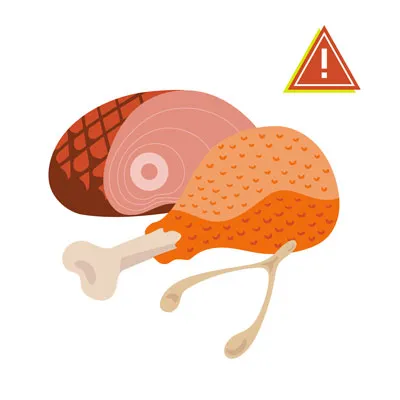 Chicken and turkey skin, ham, and other fatty cuts of meat are dangerous for dogs due to high fat content.
Chicken and turkey skin, ham, and other fatty cuts of meat are dangerous for dogs due to high fat content.
Raw or Undercooked Meat
Feeding your dog raw or undercooked meat is highly discouraged by many veterinary professionals. The primary concern is the presence of harmful bacteria like Salmonella and E. coli, which can cause severe gastrointestinal illness in dogs, just as they do in humans. While some dogs may appear to tolerate raw meat, they can still carry and shed these bacteria, posing a risk to other pets and humans in the household, particularly those with compromised immune systems, puppies, and elderly dogs. Beyond bacterial contamination, raw meat can also contain parasites.
While some proponents advocate for raw feeding, and there are discussions around what dogs can eat raw meat, the consensus from many veterinary professionals is to avoid it due to these significant health risks. Puppies and elderly dogs, in particular, have less developed digestive and immune systems, putting them at greater risk from substances found in raw dog food.
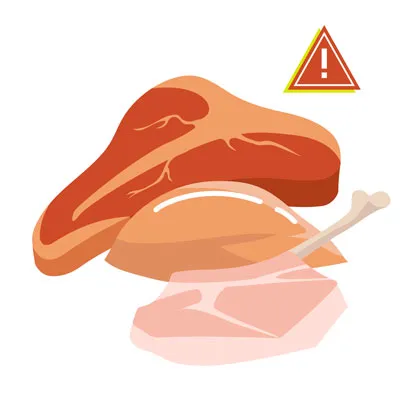 Raw meat can contain harmful bacteria like Salmonella and E. coli, posing health risks to dogs.
Raw meat can contain harmful bacteria like Salmonella and E. coli, posing health risks to dogs.
Bones (Cooked and Raw)
Bones, whether cooked or raw, present considerable hazards to dogs. Cooked bones become brittle and can easily splinter, leading to choking, internal obstructions, or severe damage to the esophagus, stomach, or intestines. These splinters can puncture organs, potentially causing life-threatening abdominal infections. Raw bones, while less prone to splintering, still pose a choking risk and can cause gastrointestinal upset or blockages. It is generally safer to avoid giving any bones from your plate. Understanding what types of bones can dogs eat is crucial, but for most household pets, it’s safer to provide veterinarian-approved dental chews or toys instead of real bones.
Meat Seasonings and Additives
The seasonings and additives often used in meat preparation are frequently toxic to dogs.
- Onions, Garlic, Chives, and Leeks: These members of the allium family contain sulfoxides and disulfides, which can damage a dog’s red blood cells, leading to anemia. Even small amounts, especially in concentrated forms like powders found in many prepared foods, can be dangerous. Certain Japanese breeds like Akitas and Shiba Inus are particularly sensitive, but all dogs are at risk.
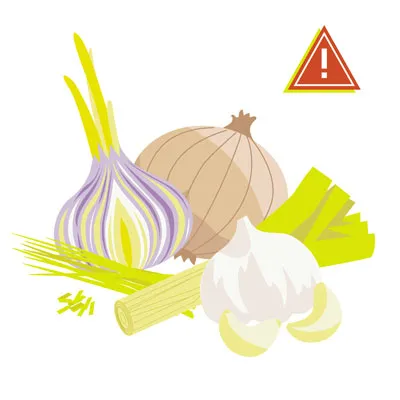 Onions, garlic, chives, and leeks are toxic to dogs and can cause anemia.
Onions, garlic, chives, and leeks are toxic to dogs and can cause anemia.
- Salt: Excessive salt intake can disrupt the fluid balance in your dog’s cells, leading to tremors, seizures, diarrhea, or even a coma. Avoid sharing salty table scraps, cured meats, or anything seasoned with a lot of salt.
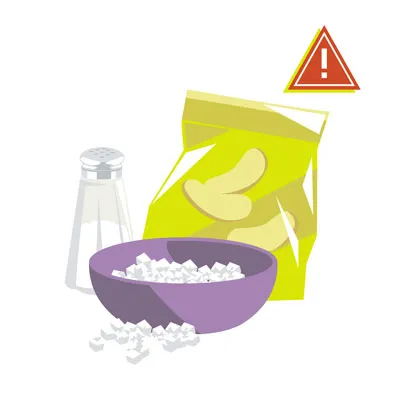 Too much salt can be dangerous for dogs, causing tremors, seizures, and even coma.
Too much salt can be dangerous for dogs, causing tremors, seizures, and even coma.
Nutmeg and Cinnamon: Nutmeg contains myristicin, which can cause hallucinations and severe vomiting in dogs, particularly in high doses or for smaller breeds. Cinnamon, while not strictly toxic, can irritate a dog’s mouth and, in large amounts, lead to low blood sugar, which has serious health implications.
Spicy Food: Hot and spicy foods can cause significant gastrointestinal distress in dogs, including vomiting, stomach ulcers, and diarrhea. These foods are painful for your dog and can result in costly emergency veterinary visits. Keep your pup away from any heavily spiced meats or sauces.
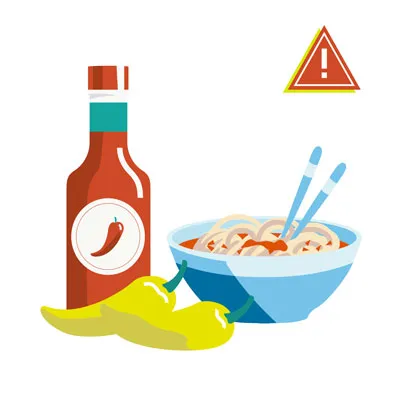 Spicy food can cause stomach upset, ulcers, and diarrhea in dogs, and should be avoided.
Spicy food can cause stomach upset, ulcers, and diarrhea in dogs, and should be avoided.
When considering any food for your pet, it’s always wise to remember the broader question of hey google what can dogs eat to ensure you’re making safe choices beyond just meat products.
Recognizing Symptoms of Meat-Related Food Toxicity
If your dog consumes something toxic, rapid identification of symptoms and quick action are crucial. Symptoms of food toxicity vary depending on the ingested substance but commonly include:
- Vomiting
- Diarrhea
- Lethargy or weakness
- Loss of appetite
- Abdominal pain or bloating (stomach may feel hard to the touch)
- Excessive drooling
- Tremors or seizures
- Changes in heart rate or breathing
If you notice any of these symptoms after your dog has ingested a potentially harmful meat product or seasoning, contact your veterinarian or a pet poison control center immediately. Be prepared to provide information on the type of food, the approximate amount consumed, and the time of ingestion. Avoid home remedies unless specifically advised by your vet, as inducing vomiting can sometimes do more harm than good depending on the substance.
Safe Meat Options (in Moderation)
While many meat preparations are off-limits, there are safe ways to share certain meats with your dog. Plain, cooked, lean meats can be excellent sources of protein and tasty treats.
- Cooked Chicken and Turkey: Boneless, skinless, unseasoned chicken and turkey breast are generally safe. Ensure they are thoroughly cooked.
- Cooked Lean Beef: Small amounts of lean, unseasoned, cooked beef (like plain ground beef or small pieces of steak) can be given as treats.
- Cooked Fish: Plain, boneless, cooked fish such as salmon or sardines, given in moderation, can provide beneficial omega-3 fatty acids. Avoid highly processed or salted fish.
- Cooked Shrimp: Plain, fully cooked shrimp, with the shell, head, tail, and legs removed, is another safe option.
Always ensure any meat you offer is thoroughly cooked, unseasoned, and free of bones, skin, and excessive fat. When preparing meals for your furry friend, always prioritize plain, cooked options. For those interested in exploring different dietary approaches, resources like what can dogs eat on a raw diet offer more specialized information, but always consult your vet before making significant dietary changes.
Proactive Steps to Keep Your Dog Safe
Preventing your dog from accessing harmful meat and meat products is the most effective strategy.
- Store Foods Out of Reach: Keep all toxic foods, including raw meats, bones, and heavily seasoned dishes, on high shelves or in secure cabinets that your dog cannot access.
- Avoid Feeding from Your Plate: Resist the temptation to share table scraps, especially during meals. This helps prevent your dog from developing habits of begging and accidentally ingesting harmful foods.
- Educate Family Members and Guests: Ensure everyone in your household and any visitors understand the importance of not feeding your dog human food without your explicit approval.
- Be Careful During Holidays: Holidays often involve rich, fatty, and highly seasoned foods. Be extra vigilant during these times, as a lapse in attention can lead to accidental ingestion of dangerous items.
Prioritizing Your Dog’s Health
As responsible pet parents, our goal is to provide our dogs with a safe and healthy environment. By understanding what meat should not be given to dogs, including raw meat, fatty cuts, bones, and seasoned dishes, you can significantly reduce the risk of food-related illnesses and emergencies. Always opt for plain, cooked, lean meats as occasional treats, and when in doubt, consult your veterinarian. Their expertise is invaluable in navigating your dog’s dietary needs and ensuring their long-term well-being. Keeping a list of emergency vet contacts and poison control information readily available is also a smart move for any pet owner.
By staying vigilant and informed, you empower yourself to make the best dietary choices for your beloved companion, ensuring they live a happy, healthy life free from preventable food hazards.
References
- “Top 10 dog poisons,” Hilary Parker (5/2023), WebMD, https://www.webmd.com/pets/dogs/top-10-dog-poisons
- “People foods to avoid feeding your pets,” (n.d.), ASPCA, https://www.aspca.org/pet-care/animal-poison-control/people-foods-avoid-feeding-your-pets
- “People foods dogs can and can’t eat,” (3/2024), American Kennel Club, https://www.akc.org/expert-advice/nutrition/human-foods-dogs-can-and-cant-eat/
- “Can dogs have nutmeg?” Barri J. Morrison (11/2023), PetMD, https://www.petmd.com/nutmeg-safe-dogs
- “Onion, garlic, chive, and leek poisoning in dogs,” Renee Schmid et al. (2024), VCA Animal Hospitals, https://vcahospitals.com/know-your-pet/onion-garlic-chive-and-leek-toxicity-in-dogs
- “About pet food safety,” (4/2024), CDC, https://www.cdc.gov/healthy-pets/about/pet-food-safety.html
